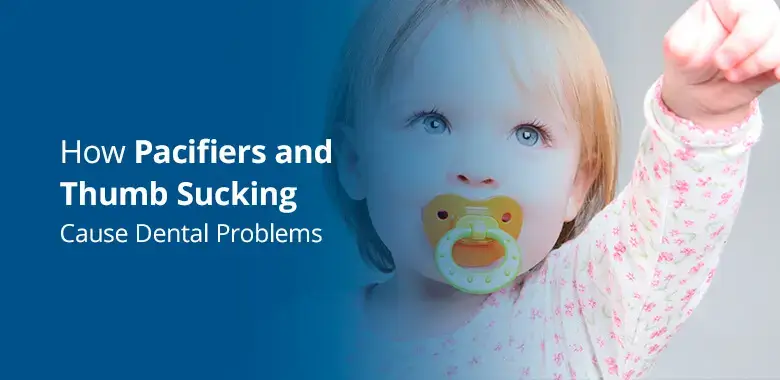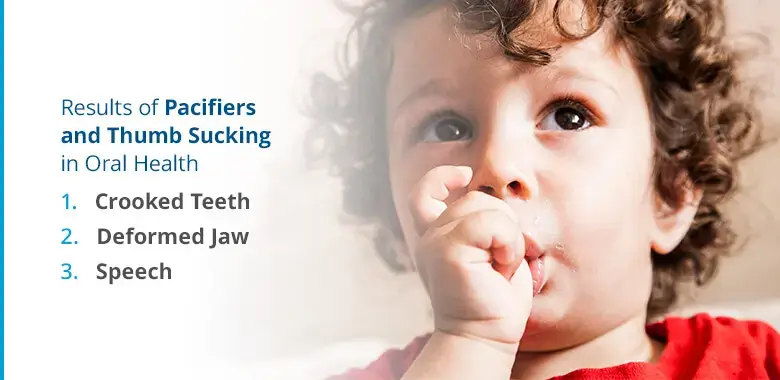
During infancy, thumb sucking and pacifiers can help soothe your baby and help them sleep. It’s a natural reflex that helps your child feel more comfortable. While this habit is harmless at first, prolonged pacifier use or thumb sucking can impact your child’s oral development. The use of pacifiers and thumb sucking is safe in the short run, as long as you transition your child away from this habit before they get older.
As a parent, you’ll do whatever it takes to help your child grow and develop properly. If your child sucks their thumb or uses a pacifier, this guide will explain when to break the habit to preserve their oral health.
Pacifiers and Thumb Sucking
It’s extremely common for children to suck their thumb or pacifier throughout early childhood. Approximately 90% of infants begin sucking their thumb or fingers within two hours of birth. Many children grow out of this habit on their own, but others may have a challenging time stopping.
Pacifiers and thumb sucking can have similar impacts on your child’s teeth. However, pacifier usage is easier to stop than thumb sucking. Since your child’s thumbs and fingers are always available to them, you can’t take them away like a binky.
The effects of thumb sucking and pacifier use on teeth depend on the frequency and level of suction. It’s important to limit your child’s pacifier use rather than letting them suck on it all day. Extended usage will have a more significant impact on oral development in toddlers and older children.
While you can’t control how hard your child sucks their thumb or pacifier, monitoring it is important. Some children gently rest their thumbs in their mouths while others vigorously suck on them. This places excess force on the teeth, shifting them out of place. Children with stronger suction may benefit from transitioning away from thumb sucking or pacifier usage at a younger age.
Should I Limit My Child’s Thumb Sucking or Pacifier Use?
When your child is young, you can let them suck their thumb or pacifier. It only becomes harmful when it continues beyond a certain age. Most children gradually stop sucking their thumb or pacifier between the ages of 2 and 4 years old. However, some kids will need their parents’ help overcoming this habit.
When should kids stop using pacifiers? Parents should start limiting their child’s pacifier use and discourage thumb sucking if they haven’t quit on their own by age 4. When your child’s adult teeth start growing, pacifier use and thumb sucking result in permanent damage. Children start losing their primary teeth and growing their permanent teeth at age 6, so it’s crucial to eliminate thumb sucking or pacifier use by this age.
At first, children suck their thumbs as a natural reflex. Older kids suck their thumbs for comfort and stress relief. When it’s time to stop, they must find other ways to self-soothe. Implementing the correct strategies can help your child overcome this habit with as little stress and discomfort as possible. These tips can help make the process easier on you and your child:
- Be positive: Avoid punishing your child for using their pacifier or sucking their thumb. Instead, offer them praise and rewards for not doing it.
- Explain why: Encouraging your child to quit using a pacifier or sucking their thumb can make them confused or upset. Tell them why they should stop and what will happen to their teeth if they don’t. Some children respond better when their dentist explains why they should stop.
- Be patient: If your child has been sucking their thumb or pacifier for their entire life, it will take time to break this habit. Wean them off gradually by limiting the times when they can suck their thumb or have their pacifier.
- Offer a substitute: A plush stuffed animal or blanket can provide your child the same comfort as using a pacifier or sucking their thumb. It’ll take time for them to adjust, but they’ll eventually learn to comfort themselves without harming their teeth.

Results of Pacifiers and Thumb Sucking in Oral Health
Over time, pacifier use or thumb sucking may cause your child’s teeth to develop incorrectly. The suction and presence of a foreign object — whether a thumb or binky — displace the teeth and can impact the jaw and shape of the mouth. Here are some potential challenges caused by thumb sucking or pacifier use:
1. Crooked Teeth
Children who frequently suck their thumb or pacifier constantly have a foreign object in their mouth. As a result, their teeth form around this object, causing malocclusion — otherwise known as crooked teeth. The bottom row of teeth is pushed in, while the top row is pushed up and out, often causing an open bite to form. Children with an open bite have a large gap between their top and bottom teeth even when their mouth is closed.
Overbites are another common issue caused by thumb sucking and pacifier use. An overbite occurs when the front teeth are pushed out much farther than the bottom, creating a “bucked tooth” appearance. Malocclusion can make children feel self-conscious and even impact how they eat and speak.
2. Deformed Jaw
Your child’s teeth are not the only thing impacted by thumb sucking or pacifier usage. The teeth, jaw, and muscles work together to make facial expressions, speech, swallowing, and chewing possible. When the teeth shift to an unnatural position, your child’s facial muscles also change. The pressure from thumb sucking or pacifier usage causes the jaw and surrounding tissues to form incorrectly. The presence of a foreign object also prevents the jaw from resting in the proper position. In extreme cases, your child’s facial structure and appearance may change, requiring extensive treatment.
3. Speech
The position of the teeth, jaw, and surrounding tissues impact your child’s ability to speak. Misalignment from prolonged thumb sucking or pacifier use can cause speech impediments and lisps. Constantly having a thumb or binky in their mouth also prevents children from practicing formative language skills.

Get Help From AZ Family Dental
Taking care of your child’s teeth is a big responsibility. At AZ Family Dental, we’ll provide thorough cleanings and expert advice to help keep your child’s teeth healthy. We’ll update you on your child’s oral health status and answer any questions you may have. If thumb sucking or pacifier use has impacted your child’s teeth, we can recommend corrective treatments.
With over 40 years of experience working with kids, our compassionate staff strives to create a stress-free experience for you and your child. Call 623-939-6574 or message us online to schedule an appointment today!
